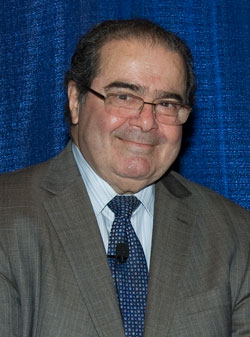Scalia's dissent: 'For no good reason,' courts are deferring to federal agency interpretations

File photo of U.S. Supreme Court Justice Antonin
Scalia courtesy of ABA Media Services.
The U.S. Supreme Court is siding with the Environmental Protection Agency—and the timber industry—in a decision holding that timber companies don’t have to obtain Clean Water Act permits to channel stormwater runoff from logging roads.
The court ruled in a 7-1 decision (PDF) finding that the EPA’s interpretation of its own regulations should be given deference. Justice Anthony M. Kennedy wrote the majority opinion while Justice Antonin Scalia wrote a partial dissent saying it’s time to stop relying on deference to agency interpretations that are contrary to a natural reading of their regulations.
The Clean Water Act requires permits if discharges are deemed to be “associated with industrial activity.” The EPA had said the requirement didn’t apply to runoff from logging roads. It clarified its position with a new regulation issued three days before oral arguments that said logging operations don’t have to obtain such permits unless they involve rock crushing, gravel washing, log sorting or log storage.
Kennedy said the new regulation does not make the case moot since violations of the prior regulations could result in sanctions. Focusing on the prior rule, Kennedy said the EPA’s interpretation “was a permissible one.” The regulation referenced “manufacturing” and “facilities,” for example, leaving open the rational interpretation that it applies only to traditional industrial buildings, he wrote.
Scalia agreed with a portion of the court’s ruling finding the case is not moot, but took the court to task for agreeing with the EPA interpretation. The majority “gives effect to a reading of EPA’s regulations that is not the most natural one, simply because EPA says that it believes the unnatural reading is right,” Scalia wrote.
In Scalia’s view, it is time to overrule Auer v. Robbins, a 1997 case establishing the general rule that courts defer to an agency’s interpretation of its own regulation unless it is plainly erroneous or inconsistent with the regulation.
“Enough is enough,” Scalia said. “For decades, and for no good reason, we have been giving agencies the authority to say what their rules mean, under the harmless-sounding banner of ‘defer[ring] to an agency’s interpretation of its own regulations.’ ”
A concurrence by Chief Justice John G. Roberts Jr., joined by Justice Samuel A. Alito Jr., says it may be appropriate to re-examine Auer in the future “but this is not the case.” The issue has not been briefed, Roberts said, except for two amicus briefs filed by “dueling groups of law professors.”
The case is Decker v. Northwest Environmental Defense Center.



